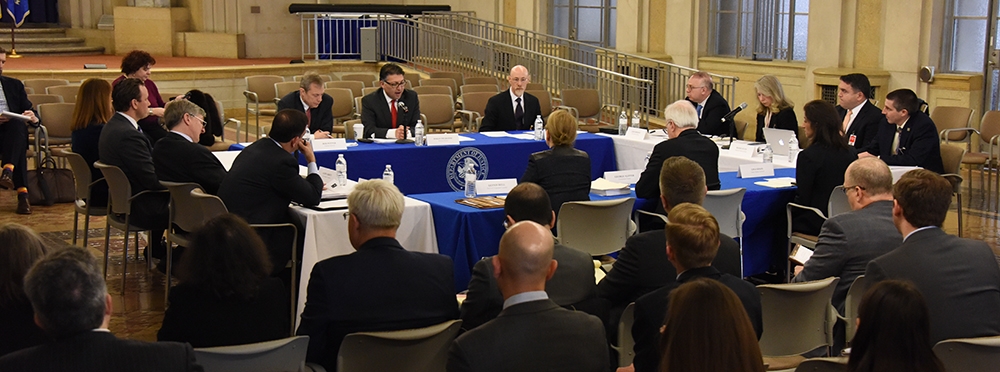Roundtable on Exemptions and Immunities from Antitrust Laws
RFK Department of Justice Building, the Great Hall
950 Pennsylvania Avenue NW
Washington, DC 20530
United States
Event Details

Related pages:
Roundtable Information
The first roundtable examined exemptions and immunities from the antitrust laws, and their impact on the free market and consumers. It also included a discussion of the appropriate role of the state action doctrine in light of the broader federal policy favoring competition in interstate commerce.
Date and Location
|
March 14, 2018 |
The Great Hall |
Roundtable Agenda
|
10:00 a.m. |
Makan Delrahim, Assistant Attorney General for Antitrust |
|
10:05 a.m. |
Introductions and Statements from Roundtable Participants |
|
11:00 a.m. |
Session 1 The impact of express statutory exemptions and implied immunities from the antitrust laws. We will explore how segments of the economy with express exemptions may be unique, review justifications for those exemptions, and consider whether they are, and continue to be, warranted. We will also evaluate whether statutory exemptions harm consumer welfare. |
|
11:30 a.m. |
Session 2
How implied immunities and exemptions have affected antitrust enforcement. We will examine the appropriate roles of Congress and the courts in creating immunities and exemptions from antitrust laws. We will discuss whether the “implied repeal” doctrine in Credit Suisse v. Billing, 551 U.S. 264 (2007), helps or hampers competition. |
|
12:00 p.m. |
Session 3 Whether the state action doctrine in its current form strikes the appropriate balance between state sovereignty and the federal policy favoring competition in interstate commerce. We will assess policies and regulations states are adopting that may be considered exempt from antitrust scrutiny, and consider the resultant harm to competition and consumers. We will also query whether the dormant Commerce Clause could provide a meaningful limit on states’ ability to reduce competition involving interstate commerce. |
|
12:30 p.m. |
Closing Statements from Roundtable Participants |
Roundtable Participant Statements
American Bar Association, Section of Antitrust Law: John Roberti
American Antitrust Institute: Diana Moss
Consumers Union: George Slover
Open Markets Institute: Lina Khan
Public Knowledge: John Bergmayer
Heritage Foundation: Alden F. Abbott
U.S. Chamber of Commerce: Craig Wolf
Association of Corporate Counsel: Glynis Bell
Public Comment Submissions
The Department of Justice welcomed comments in advance of each of the roundtables. The Department accepted public comments (not to exceed 20 pages) regarding the first roundtable until March 13, 2018. The comment period is now closed.
REG1-0001 Sherlock, James
REG1-0002 Global Antitrust Institute
REG1-0003 Association of Dental Support Organizations
REG1-0004 Wine and Spirits Wholesalers of America
REG1-0005 Cleland, Scott
REG1-0006 National Council of Farmer Cooperatives
REG1-0007 Ballad Health
Privacy and confidentiality: Written submissions and the identity of the submitter may be disclosed, reproduced, and distributed by publication and/or posting on the Department of Justice website, at the discretion of the Department of Justice. Information that is submitted in connection with this event cannot be maintained as confidential by the Department of Justice. Written submissions should not include any information that the submitting person seeks to preserve as private or confidential.

 U.S. Department
of Justice
U.S. Department
of Justice